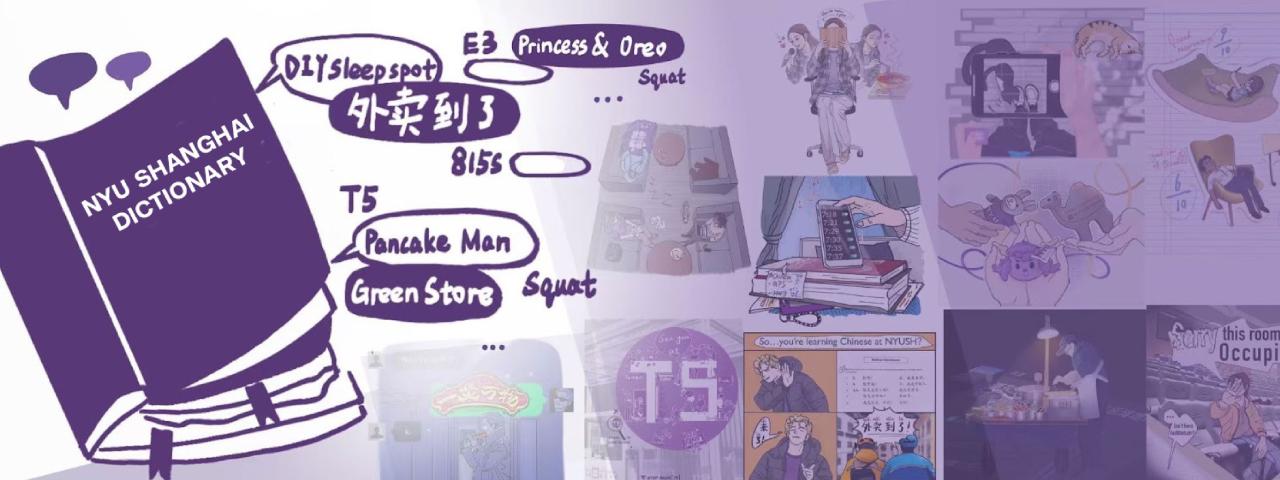
New around here? Starting university is like entering a new culture, one with its own particular rules, customs, and language, too.
Last year, students came together to compile a dictionary of NYU Shanghai-specific slang. Artist Torico Chen ’27 and creative director Linda He ’27 worked together for months to bring these NYU Shanghai-specific phrases to life.
“My inspiration came from vivid moments of campus life,” says Torico, including snapping photos of campus cats, buying jianbing with friends, and hanging out with classmates. “Working on this project felt like a chance to turn everyday student life into something we can all remember together,” she added. “That made me feel like I wasn’t just illustrating slang, but helping to create a shared memory.”
Want to sound like an NYU Shanghai native? Here’s how.
Pancake Man / 煎饼果子
(noun) vendor serving up an iconic snack
Example: “Check the pancake man’s location updates via the WeChat group. Iykyk!”
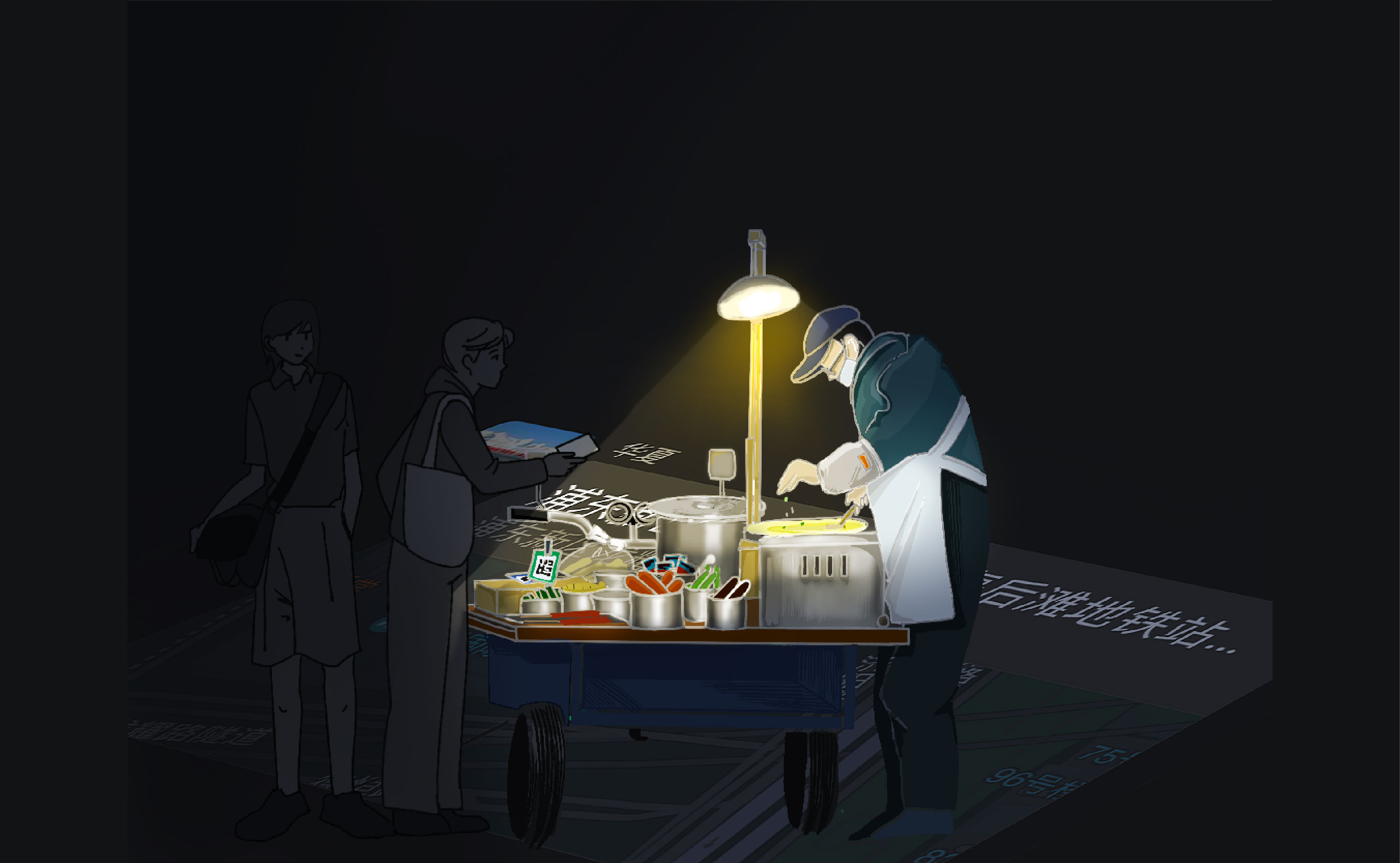
This itinerant vendor is a legend and a mystery. As daytime turns to dusk, his stall appears near the Jingyao Residence Hall, offering affordable street food to the community.
Ari Harris ’27 started visiting the pancake man the first few weeks of first year because, “managing classes and cooking can get hard,” he says, and jianbing is convenient, affordable, and customizable.
“I really love talking to him because it gives me a chance to use my Chinese, and he’s so friendly, always teaching me new words and being patient when I don’t make sense sometimes.”
Princess & Oreo
(noun) cats on campus
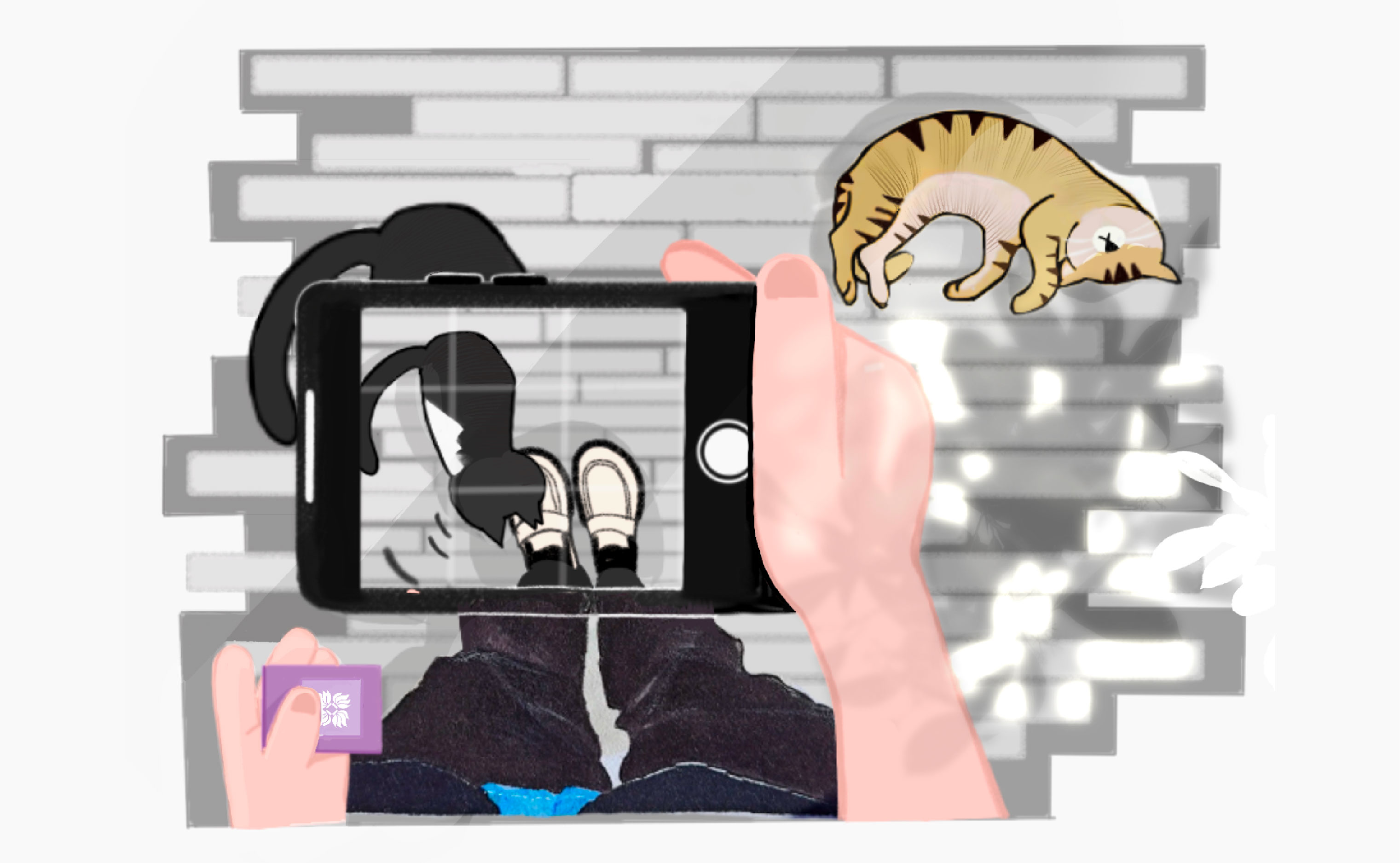
Since its opening in the spring of 2023, NYU Shanghai’s New Bund campus has been home to a few friendly felines. First came along Princess, an affectionate stray who would greet students in the quad between classes, followed by Oreo--usually stationed at the west entrance to sunbathe as he welcomed guests.
Ma Jingyi ’26 remembers the whole community rallying together to take care of Princess and Oreo when they first appeared around January 2024. Princess in particular captivated the student body. “Her personality made her stand out,” Jingyi says. “Princess was the symbol of our campus for a long time, and she really loved interacting with people, even sleeping on our laps.”
While both have been adopted by caring community members, other cats have followed in P&O’s pioneering pawsteps, inspiring Jingyi and others to form the NYU Shanghai “Kitty Committee.” Members take on the responsibility of providing food and securing shelter during the winter months, as well helping stray cats get neutered and adopted.
Squat /占用
(verb) to occupy and repurpose an entire classroom for oneself
Example: “I wanted to use E101, but someone was already squatting it.”
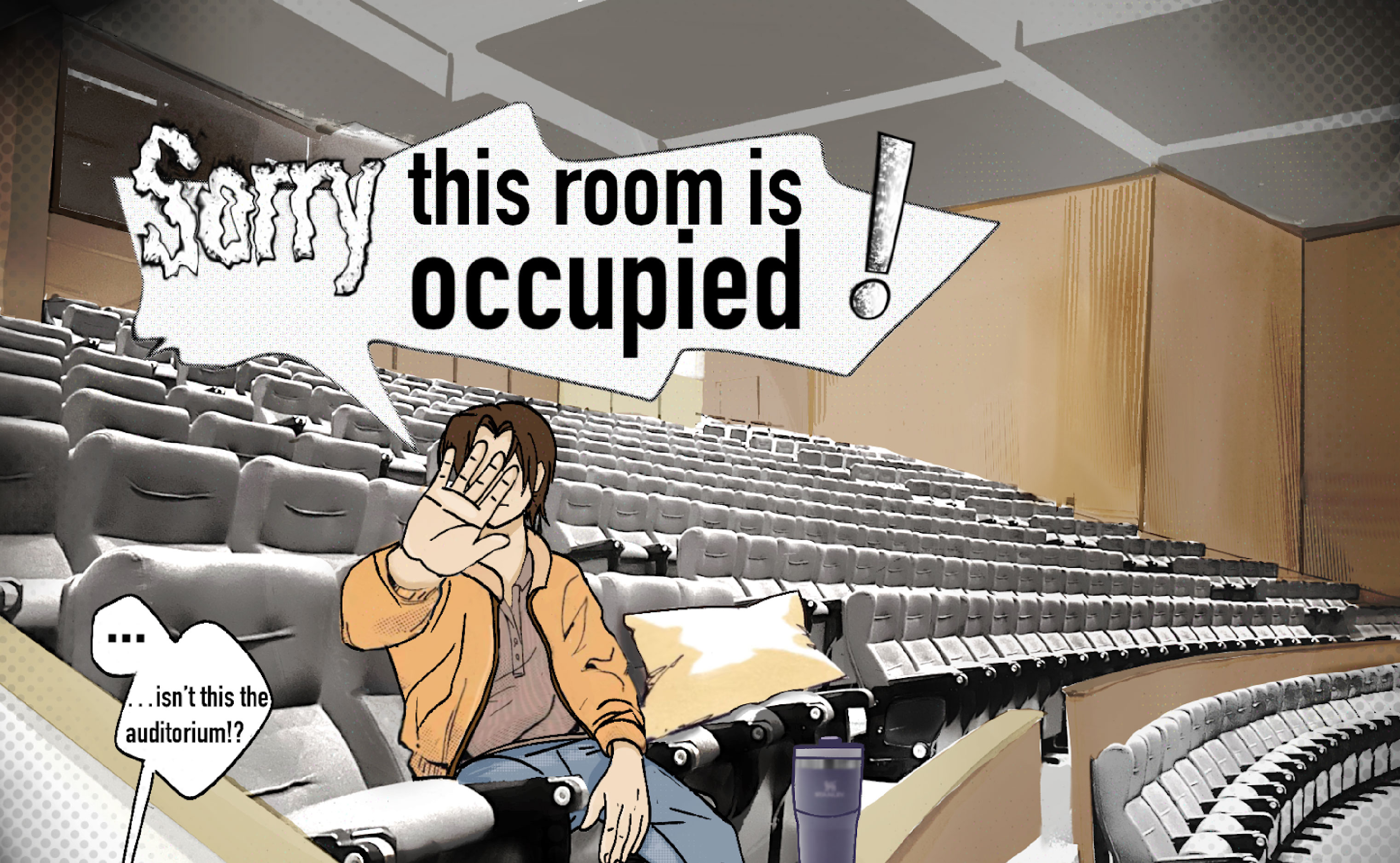
Some students say walking into a room on campus occupied by just one person studying feels awkward. “It’s the feng shui of the room,” says Theodore Tolan ’26. “It feels like a weird dynamic when you come and there is that natural power imbalance with the layout of the room.” But he says there’s no use hating on squatters. “If you’re mad, go study in the library.”
DIY Sleep Spot
(noun) chairs or calm corners on campus repurposed for much-needed naps.
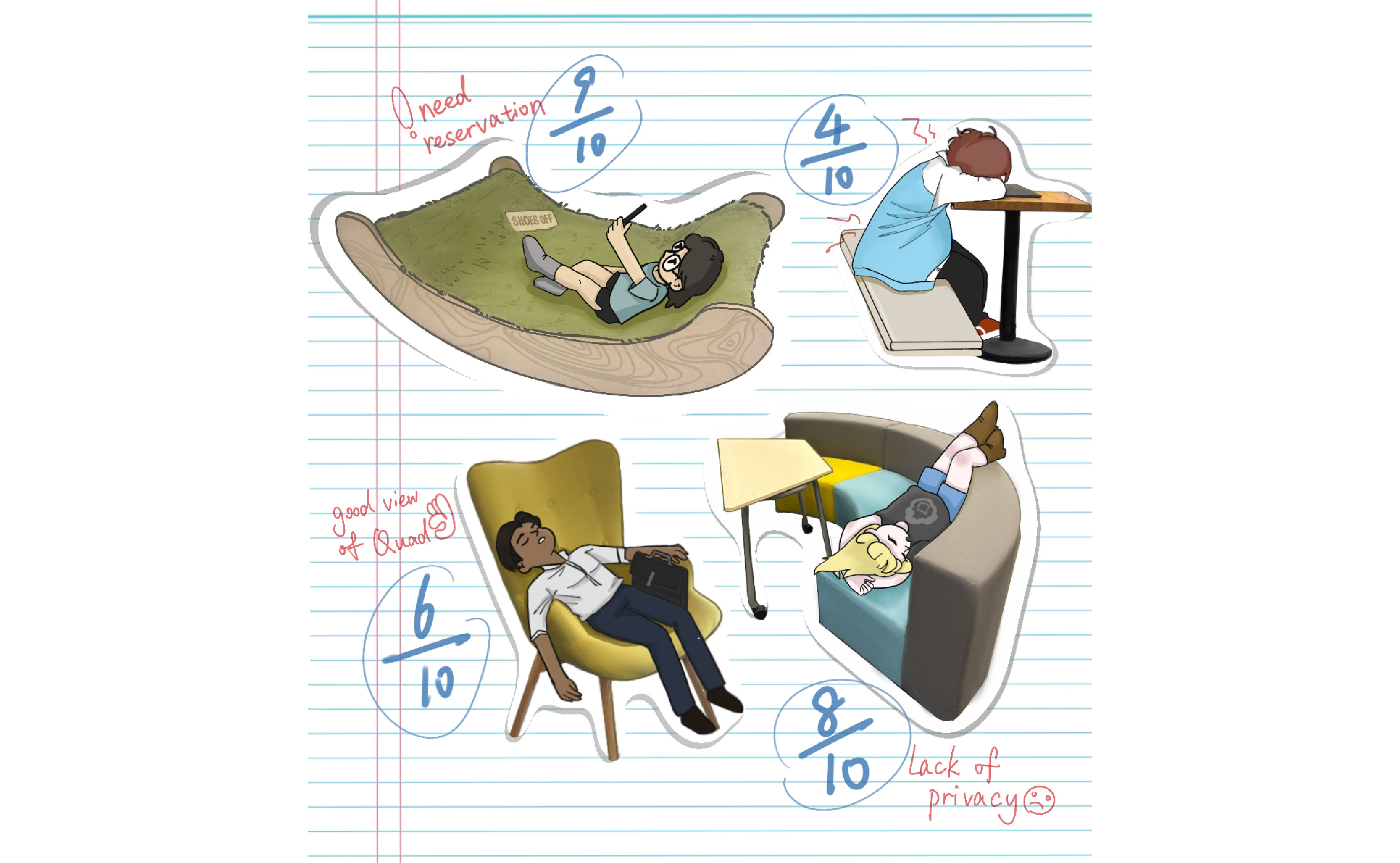
NYU Shanghai students push themselves from morning till night, attending classes, grabbing meals on the go, squeezing in a workout and still finding time for club activities. So who can blame them for crashing, quite literally, wherever they can?
Enter the DIY sleep spot—make-shift napping stations cobbled together out of sheer desperation and a well-placed backpack. Students find (or create) these unofficial, yet absolutely, essential sleep spots wherever they can.
What’s the key to a good DIY sleep spot? Some look for privacy, a hidden corner of campus perhaps. Others prefer more exposed locations.
Mya Hasbun ’28 says napping helped her get through the day as a first-year student when she had a break between classes that wasn’t long enough to warrant going back to the residence hall. “I would lie down in E3 and tell my friends to wake me up in 30 minutes,” she recalls. This year, though, she’s sworn off naps. “I’m just too busy,” she says.
Wài mài dào le!/外卖到了
(phrase) literally translated to mean “the delivery has arrived,” the phrase is used intentionally out of context by NYU Shanghai students.
Examples:
When you arrive at a party: wài mài dào le!
When you arrive late to class: wài mài dào le!
When you meet up with friends: wài mài dào le!
When you graduate from NYU Shanghai: wài mài dào le!

Wài mài dào le will probably be one of the first phrases you learn in Chinese after nǐ hǎo, xièxiè and zhège. When delivery drivers drop off your food, they give you a call to say wài mài dào le! Students hear this so often that they now intentionally use it out of context. So now it can mean: “Hey!” or “I’m Here!” or “You’re Here!”
Lily Blair ’26 says the phrase has entered the NYU Shanghai pop culture lexicon as an instant inside joke. “When I host game nights, my friends yell wài mài dào le! when they knock on my door,” she says. Inspired, she and her friends dressed up as delivery drivers on Halloween and walked around the residence hall yelling wài mài dào le!”
Legend has it that the phrase was even included in a student’s graduation commencement speech (Fact-check: True! Watch Class of 2018 student representative Itmum Momin’s speech around the four minute mark).
Study Away Cousins
(noun) visiting NYU fam from New York and Abu Dhabi campuses.
Example: “We’re study away cousins—we come from different backgrounds, but we’re from the same Violet family.”
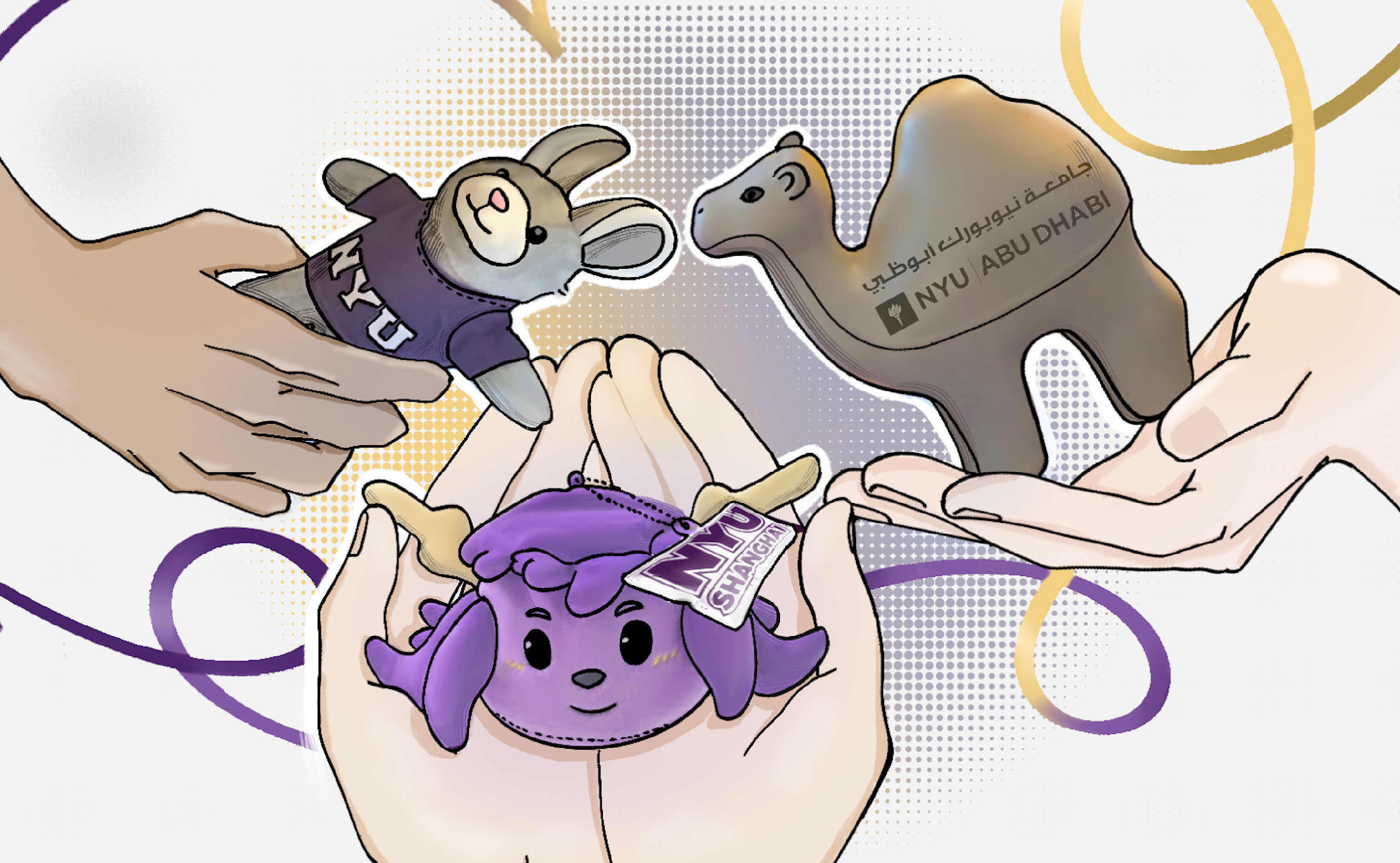
Roman O’Brien ’27, who coined the term “study away cousins,” says it reflects the feeling on campus among students.
“When study aways come over, it's like your cousin coming over,” she says. “You are from different houses, different places, different parents, but regardless, we are related in some way. We have something in common which is NYU, but like big NYU, not like New York NYU.”
While this one hasn’t quite caught on yet, we think it should. It’s a metaphor that nails the mix of familiarity and fresh perspective that study away students bring with them. There's a shared sense of kinship—like long-lost relatives reunited through the global university network.
Sure, your “cousin” might not understand how things work here. But give it a few weeks, and they’re family.
815s / 早八
(noun) that unfortunately-scheduled early class
Example: “815s will be the end of me!”
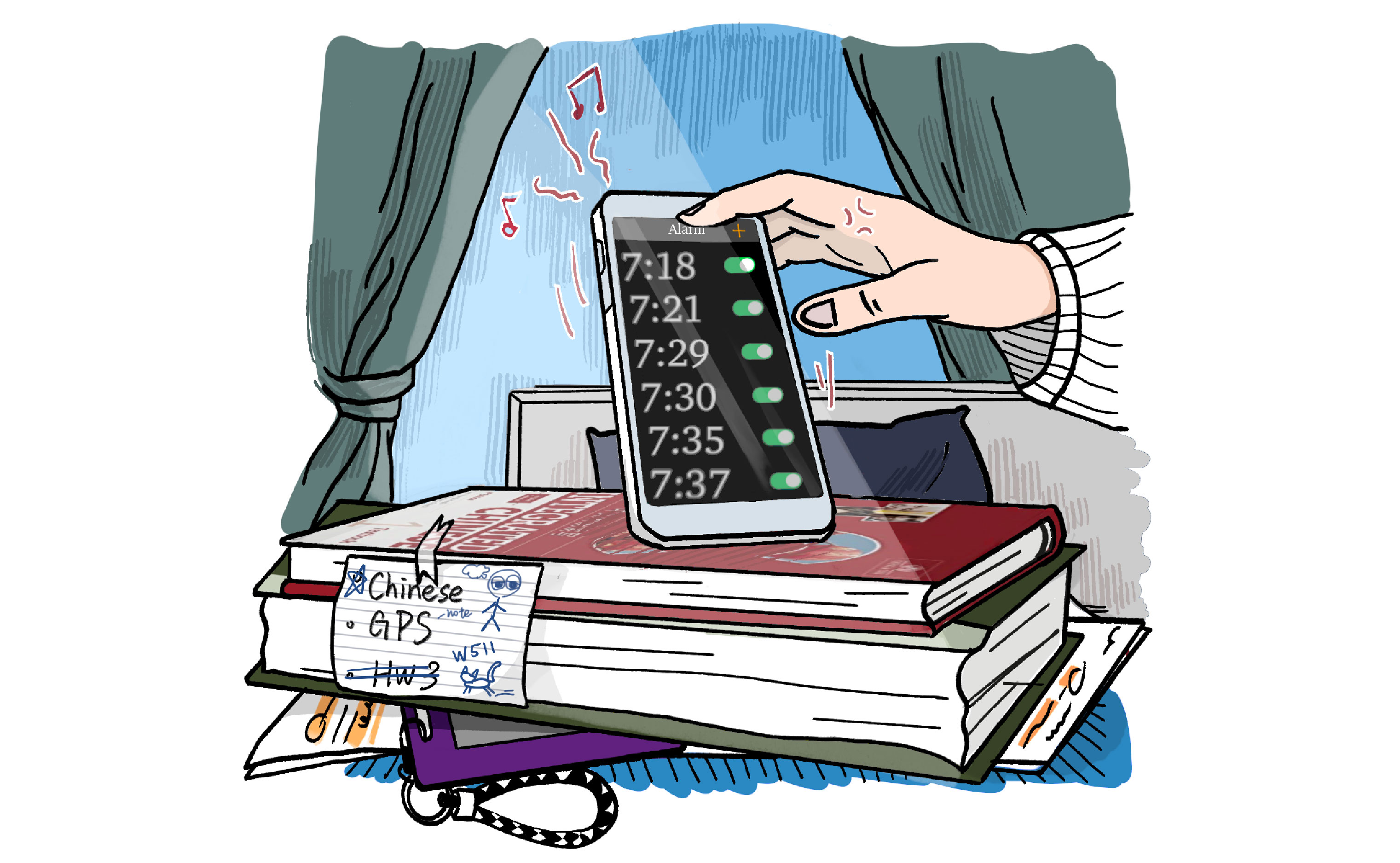
The first class period of the day begins at 8:15am, but for some students it can signal trouble.
“These 815s will be the end of me!” is something you’ll often hear a few weeks into the semester, when students’ pre-semester ambitions of early mornings give way to pangs of regret.
Many students who took 815s and lived to tell the tale say they aren’t for the faint of heart. Some say the early class time even contributed to a poor grade.
Erdemdelgerekh Battogtokh ’28 says she learned the hard way that early morning classes are a huge commitment. “While taking an 815 in my first semester, I was always thinking, ‘Am I cooking this class or am I getting cooked!?’ Let’s just say I’m taking a break from 815s,” she says.
But Catherine Yi ’27 says she prefers scheduling early classes. “It makes me feel like I have more time in my day,” she says. “Waking up early is hard, but I found when I take early classes, I’m more productive and less lethargic than my afternoon ones.”
Sometimes, she says, she gets up even earlier to go for a run before class. “It’s really nice seeing the city in the early morning, a view I wouldn’t see if I didn’t choose the 815s,” she says.
Green Store / 绿牌子
(noun) the popular late-night skewers joint across from Jingyao Residence Hall
Example: "I'm starving, meet me at the green store?"

This reflects a broader NYU Shanghai student culture of color-coding to identify and communicate shops across languages. Around campus and the residence hall, NYU Shanghai students can often be found at “green,” “red,” “yellow,” “blue,” and other color-coded spots.
“I love the green store,” enthuses Bonnie Chang ’28. “They have the best skewers and clay pot rice.” As for why she and others persist in calling it the “green store,” she hypothesizes that some international students call it that because they don’t know how to read the Chinese characters. Yet, she says, the unofficial name has caught on among the entire student population. “My bestie is from Beijing, and I still say ‘green store’ to her.”
H&K
(abbreviation) hot pot and karaoke—how NYU Shanghai students celebrate finishing their exams
Example: “Survived midterms. H&K to celebrate!?”
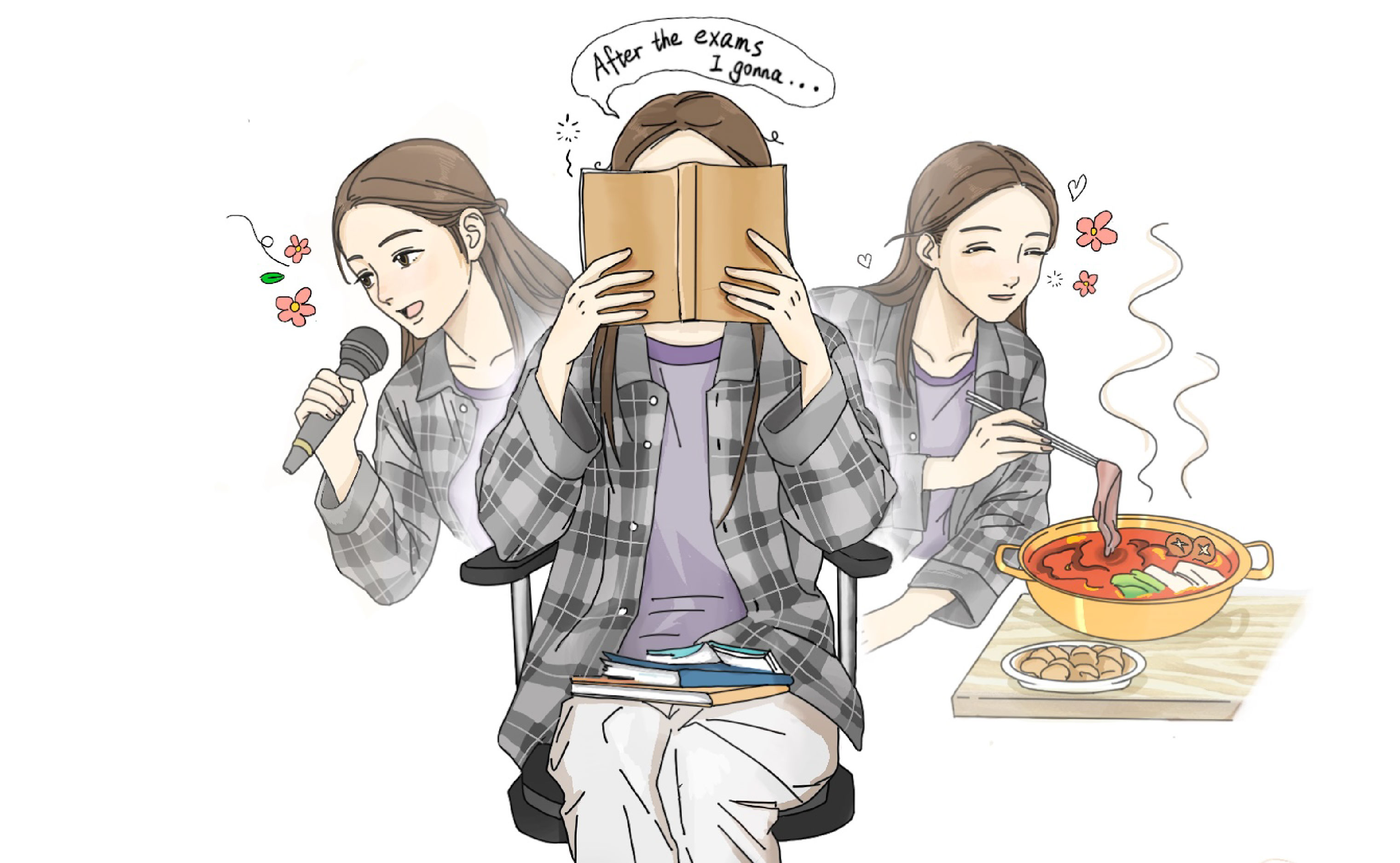
Hot Pot & KTV—NYU Shanghai students say this combo is the ultimate way to let loose after a stressful exam. Or just another Thursday night…
A more recent addition to campus traditions, the post-exam H&K is quickly becoming a symbol of NYU Shanghai’s unique cultural fusion. In its blend of relaxation and revelry, exam stress melts away amidst the heat of bubbling hot pot and the kinetic energy of KTV. So grab your apron, belt out your favorite Jay Chou or K-Pop song, and wrap up exam season in the best way possible.
Vivian Zhang ’28 and Savanna Lee ’28 say that with all the stress that comes with their courseload, it’s important to find fun ways to relax with friends. “H&K is our hack to maintain a mentally healthy college experience,” says Zhang. “We get to dump all the stress out from finals and exams by singing karaoke and enjoying hotpot!”
E3 and T5
E3 (abbreviation) the hangout/study spot on East 3rd Floor by Magnolia House Cafe
Example: "Catch you at E3 between classes!"
T5 (abbreviation) Tower Five of the Jingyao Residence Hall.
Example: I need to get out of the library; let's study in T5 tonight.
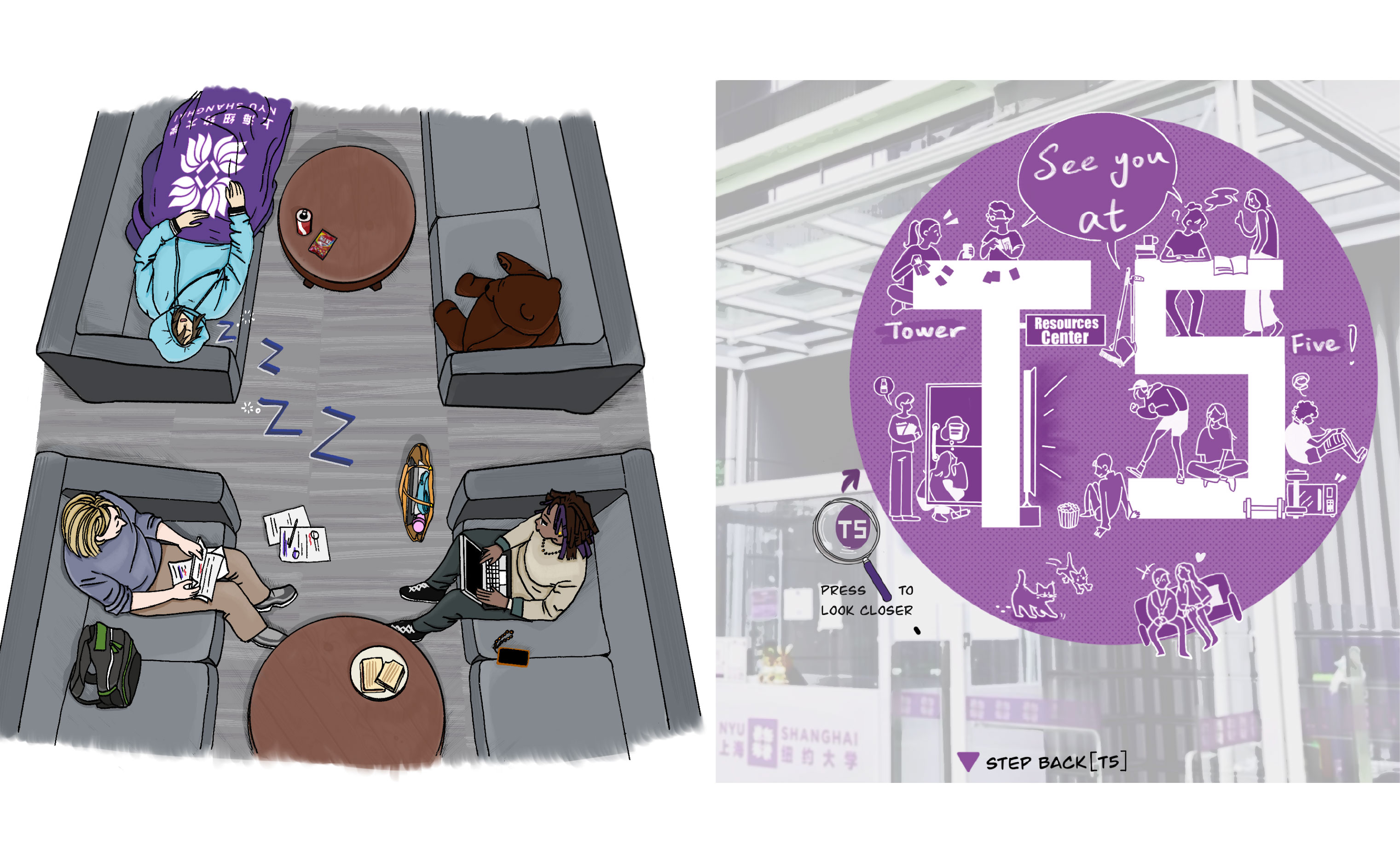
This project was conceived and led by GPS Teaching Fellow Dr. Warren Stanislaus in collaboration with the NYU Shanghai broadcasting club NYU Shanghai Now during the 2024-2025 academic year. Torico Chen ’27 created the art and Linda He ’27 was creative director. GPS Teaching Fellows Dr. Wujun Ke and Dr. Lucien Monson provided research.

